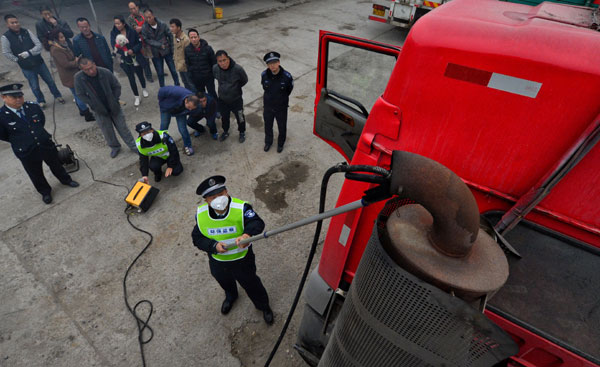Capital tightens emission standards for automobiles
Subsidies of up to 12,000 yuan will be given to drivers who replace their high-polluting vehicles
Beijing announced stricter emission standards for cars on Monday to improve air quality in the capital.
Starting on Dec 15, gasoline cars with National I and II emission standards will be banned from the road in Beijing when the city has an orange or red air-quality alert.
Furthermore, those cars will be banned from the road from Monday to Friday starting on Feb 15 next year.
"The number of cars with National I and II emission standards make up 8 percent of the cars registered in Beijing. However, the emissions from those cars account for more than 30 percent of all emissions from cars in the city because of their low standards," said Fang Li, spokesman for the Beijing Municipal Environmental Protection Bureau.
There are 5.7 million cars in Beijing, which produce about 500,000 metric tons of polluting emissions annually, according to the bureau.
Car emissions are one of the major sources of air pollution in Beijing, and the number of cars in the city is still growing, Fang said.
"Making cars on the road cleaner is an important way to cut pollution," he said. "In fact, this method is widely used in major European cities and proven to be effective."
According to Fang, only cars with emission standards higher than European IV are allowed on the road in London. European IV emission standards are approximately equal to China's National IV standard, which is much higher than National II.
"In certain big cities in Italy and Germany, authorities set up 'low-emission areas', where only cleaner cars can drive," he said.
To encourage car owners to replace their high-emission cars, the government is providing owners with subsidies of between 5,000 yuan ($725) and 12,000 yuan. The subsidies will be given from Dec 1 to the end of next year.
Wang Ying, deputy head of Beijing's Finance Bureau, said the financial compensation comes with the new regulations that encourage people to upgrade their vehicles and contribute to improving air quality.
"There will be no subsidies after 2017," he said.
The banks are required by authorities to give loans on favorable terms to people who replace their high-emission cars.
dujuan@chinadaily.com.cn
|
 Environmental inspectors check the exhaust of a truck at a logistics park in Beijing's Tongzhou district this month. Guo Qian / For China Daily |


















